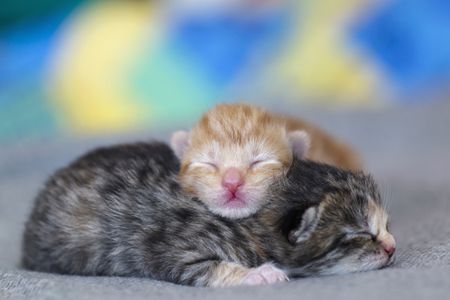Raising a kitten is one of the most challenging things one can do. At birth, one weighs about 100 grams only. With a fragile body, holding her requires a lot of skill and experience.
To add salt to injury, newborn kittens don’t see or hear anything for the first few weeks. They rely on mom or you to guide them around.
What’s even worse is that they are very susceptible to all kinds of attacks – parasite infestations, pneumonia, dehydration, you name it.
One of the ways to monitor a kitten and determine if she’s healthy or not is by watching her weight.
Like human babies, kittens should gain weight as they grow. Sadly, some catch something that affects their weight. They can either lose weight or stagnate in one place.
Others feed way too much and pack on the pounds too fast.
Neither is okay. So, how do you know if your kitten is at a healthy weight or not? We have a detailed guide below.
The Importance of Weight Monitoring
Keeping track of your kitten’s weight is an important tool in gauging the growth of your little feline friend.
Knowing how much she should weigh every week helps you determine her nutritional needs.
As she grows, her food intake goes up and you should be on top of this. Additionally, the weight will tell you if your kitten is healthy or not.
Ideally, kittens that don’t grow or gain weight are usually unhealthy. When you catch a problem earlier on, you can provide the necessary treatment in good time.
Lastly, the weight of your kitten is directly related to her age. If you come across a stray, you can tell her age by how much she weighs.
How Much Does A Newborn Kitten Weigh?

Cats come in different sizes. The Siamese, for instance, weighs about 5 pounds as an adult. The Maine Coon, on the other hand, can go all the way to 25 pounds.
As a rule of thumb, the weight of a kitten is approximately 2-3% of the queen’s weight. This is according to an article published by Zooplus Magazine.
That means that a cat weighing 10 pounds should give birth to kittens each weighing 0.2 – 0.3 pounds (3.2 -4.8 ounces). A 5-pound kitty will reproduce offspring half this weight.
Birth weight doesn’t only depend on the breed of the cat. The size of the litter also matters.
Kittens with many siblings are understandably smaller than those from smaller litters.
Furthermore, the queen’s living conditions during gestation also play a role. Poor nutrition, illness, and stress negatively affect the weight of the kittens born.
Based on this, the average kitten should weigh approximately 100g at birth going by the report of Dr. Margaret Casal – a pediatrics expert at the University Of Pennsylvania School Of Veterinary Medicine.
Besides weighing 100grams when born, kittens should typically gain about 100grams every week.
When Do Kittens Stop Gaining Weight?
Immediately after birth, for about three days, most kittens often lose some weight.
The adjustment to the outside world can be challenging for some young cats.
Thankfully, most often gain the weight afterward and keep it up for the next 12 or so weeks.
However, when their little teeth fall out and others shoot up in their places, appetite takes a nose dive.
As a result, most kittens lose pounds or gain weight much slower.
When To Worry

A kitten that loses weight or gains too little is cause for concern. There are many reasons why this would happen.
For one, when the mother cat fails to produce enough milk, her litter will not have enough to eat.
As a result, the kittens will not grow as they should. In this case, increase easily digestible food with plenty of energy for the momma cat.
If using kitten formula, increase the amount or frequency of feeding and see if anything changes.
If the kitten still loses some more weight, bring her to the vet. Kittens are extremely sensitive.
Parasite infestations, medical conditions, and innate disabilities (such as cleft palate) can really affect them. Let her be examined for hereditary issues as well.
Can A Kitten Be Overweight?
Being underweight is always the most outspoken danger sign in a kitten.
However, being obese is equally risky. When a kitten is overweight, the chances of her being obese as an adult are pretty high.
Ultimately, this translates to more issues in the future such as diabetes, arthritis, lung conditions, and heart conditions.
Being overweight is caused by overfeeding, a sedentary lifestyle, overindulgence, or weight changes after spaying or neutering.
If you feel your kitten is overweight, speak to your vet.
FAQs

1. How much should a week-old kitten weigh?
After the first seven days, a kitten should gain about ½ ounce (14 grams) of weight every day.
Per week, this translates to about 4 ounces (113 grams).
This means that they fall in the range of 5-10 ounces (150-200 grams) after one week.
2. How much should a 2-week-old kitten weigh?
Two weeks will put a kitten somewhere in the range of 8-14 ounces (230-400 grams). This will happen if she gains ¼-1/2 ounces daily.
3. How much should a 3-week-old kitten weigh?
Following our rule of gaining 0.25-0.5 ounces daily, a three-week-old kitten should weigh 10 ounces – 1.1 pounds (300-500 grams).
4. How much should a 4-week-old kitten weigh?
A 4-week or one-month-old kitten weighs 12 ounces to 1.3 pounds (340-600 grams).
At four weeks, the kitten starts to have milk teeth. She can also be introduced to solid foods.
That can affect the weight a little but this is a good estimate.
5. How much should a 5-week-old kitten weigh?
5-week-old kittens weigh 14 ounces to 1.8 pounds (400-820 grams).
6. How much should a 6-week-old kitten weigh?
A 6-week-old kitten weighs about 1-2 pounds (450-900 grams)
7. How much should a 7-week-old kitten weigh?
Approximately 1.2-2.3 pounds (550-1050 grams)
8. How much should an 8 & 9-week-old kitten weigh?
An 8-week-old kitten weighs 1.4-2.6 pounds (635-1180 grams) while a 9-week-old kitten weighs 1.6-2.9 pounds (725-1315 grams).
At about this time, a kitten can be adopted. Being separated from her mother and siblings can cause stress and anxiety.
Ultimately, her appetite will decrease affecting her weight in turn. If she doesn’t spring back soon, be sure to rush the kitten to the vet.
Parting Thoughts
The weight of a kitten can tell you her age, health, and feeding needs.
It is a crucial part of kitten care – perhaps the most important than anything else.
Keep a close eye on your kitten’s weight chart and if something is off, contact your veterinarian.
Related Posts:
Homemade Cat Foods for Weight Gain
How Long Does It Take For A Malnourished Cat To Gain Weight?

Hi! I am Eleanor Price. I started this website after my cat, Louie, almost died from a case of botulism (a type of food poisoning often caused by bacteria that grow on food items). Turned out that my cat’s diet was the problem. I have made it my duty to provide the best information and recommendations about everything cat lovers need to know about their felines’ health and wellbeing. My goal is to find the most informative content on anything feline-related and share it with fellow hardworking kitty lovers.

